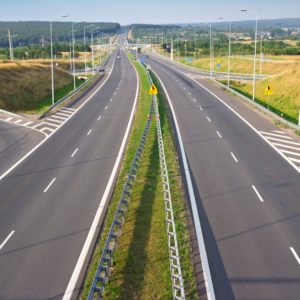Are Highways Safer Than Regular Roads?

If you have any more questions regarding highway safety, or if you have been involved in a highway accident, call the Munley Law personal injury lawyers. Our accident lawyers offer a free consultation where we will answer your questions and discuss your legal options.
Crash Fatality Statistics: Highways vs. Local and Arterial Roads
According to a 2022 report from the Insurance Institute for Highway Safety (IIHS), crash deaths in rural areas were less likely to occur on rural highways, interstates, freeways, and arterial roads. Car accidents were more likely to occur on collector roads and local rural roads.
In 2022, 16% of traffic deaths in rural areas occurred at intersections. In urban areas, 32% of crash deaths occurred at intersections. Similarly, 71% of crash deaths in rural areas happened on roads with a speed limit of 55 mph or higher, compared to 29% of crash deaths in urban areas.
Before we move on, let’s define the roads we’re talking about:
- Interstates and Freeways: These are highways that connect cities and states, designed for long-distance travel. They have limited access points and have higher speed limits. They may be federal highways, urban highways, and other major highways.
- Arterial Roads: Arterial roads are the major streets in a city. They connect major neighborhoods to each other and to the highways. These roads usually have traffic lights.
- Collector Roads: Also known as distributor roads, are neighborhood streets that will generally connect houses and businesses to the arterial roads. Collector roads will have lower speed limits and fewer traffic lights.
- Local Roads: Local roads are the smallest type of road with the lowest speed limits. Local roads are found in residential areas and provide access to individual homes and some businesses.
Why Highways Are Often Safer than Other Types of Roads
Several factors contribute to highways being statistically safer than arterial, collector, and local roads. They include:
 Limited Access Points and Intersections
Limited Access Points and Intersections
Think about the local roads you travel every day. Cars can pull onto and off the road at any given time via intersections, driveways, store fronts, and side streets. These access points and various intersections on the road inherently creates more risk of deadly crashes.
Highways have a limited number of access points where traffic can cross or merge, making a highway generally safer than a road with multiple points of interaction. In some cases, a highway may also reduce congestion on the road and improve the flow of traffic. Drivers are less likely to brake or swerve, causing a car crash.
Consistent Speed
A major factor that makes highways safer than local roads is the consistent speed limit. Arterial and local roads have changing speed limits. At one point on the road, the speed limit may be 55 mph, while a mile down may drastically change to 25 mph. Highways are far more likely to have a consistent speed limit, which helps the flow of traffic. When drivers don’t suddenly change speeds, it reduces the risk of a car accident.
The consistent speeds also help drivers maintain a safe distance behind the motor vehicle in front of them. When drivers aren’t suddenly speeding up or slowing down, it’s easier to maintain a safe following distance and avoid a car crash.
Separation of Opposing Traffic
There is often a physical barrier that separates the traffic on two-lane highways. Generally speaking, local roads only have a double yellow line. The physical median drastically reduces the risk of car crashes, especially head-on collisions.
Other reasons highway collisions are less common than traffic accidents on local and rural roads are because of the standardized signage, the better maintenance, and the wider lanes.
Highways have wide lanes that can accommodate larger vehicles, including commercial vehicles and tractor-trailers. More space means more room for a driver to move his passenger vehicle out of the way to avoid a collision.
The Federal Highway Administration regulates the signs on major highways. The standardized signage helps prevent distracted driving and confused driving, which greatly reduces the risk of traffic fatalities.
Finally, the state government maintains upkeep of the highways so a stretch of highway will often have less debris, potholes, or structural issues than local roads.
Are Highways or Roads Safer for Motorcycles?
Another surprising statistic is yes! Highways are, in fact, safer for motorcycles than regular roads. There are a few reasons for this:
- Physical dividers between lanes, decreasing the risk of head-on collisions on a motorcycle.
- There is more clear signage on highways, directing motor vehicles and motorcycles on how to connect and merge into lanes.
- Barring construction or an accident, there is generally less congestion on the highway than city streets. As mentioned earlier, the flow of traffic is better on highways, reducing the risk of motorcycle crashes.
- Highways are wider and have more highway lanes than arterial, collector, and local roads. It gives the driver and the motorcyclist more space to move away from danger.
Accidents Can Happen on Any Road

To minimize your risk of serious or even fatal crashes, make sure to:
- Obey traffic laws.
- Create a safe distance between your car and all the others on the road.
- Avoid distracted driving and aggressive driving.
- Be constantly aware of your surroundings.
If possible, don’t drive in poor weather conditions, including snow, fog, and heavy rain.
If you or your loved one were the victims of a car accident, whether it was on a highway, an arterial, collector, or local road, you must remember you have rights. At Munley Law, our car accident lawyers can help you file a car accident lawsuit against the negligent driver who caused your car accident or motorcycle accident and the subsequent injuries.
Our law firm offers a free initial consultation where you’ll speak with an experienced personal injury attorney who will assess your claim, lay out your legal options, and get to work building your case. Our offices are located throughout Pennsylvania – if you can’t come to us, we’ll come to you. Call today to get the process started.

Marion Munley
Marion Munley has been practicing personal injury law for nearly 40 years. She is triple board-certified by the National Board of Trial Advocacy for Truck Accident Law, Civil Trial Law, and Civil Practice Advocacy. She currently serves as Vice President of the American Association for Justice, an organization dedicated to safeguarding victims’ rights. Marion has won many multimillion-dollar recoveries for her clients, including one of the largest trucking accident settlements in history. She has been named a Top 10 Super Lawyer in Pennsylvania since 2023, a Best Lawyer in America, and was recently inducted to the Lawdragon Hall of Fame.
Posted in Car Accidents, Truck Accidents.
Tagged Claim Distracted Driving Insurance

 Limited Access Points and Intersections
Limited Access Points and Intersections







